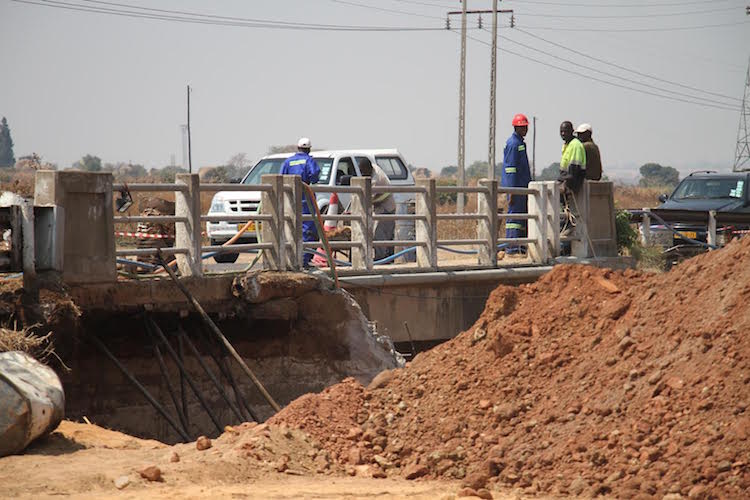
Analysis by Jeffrey Moyo
HARARE (IDN) – The third Pan African Capacity Development Forum organized by the African Capacity Building Foundation (ACBF), in partnership with the organisation’s Pan-African and international partners, has vowed to boost industry together with infrastructure, in order to promote inclusive and sustainable industrialization and foster innovation in line with the ninth goal of the UN Sustainable Development Goals.
As such, the organisation says it has invested more than $1 billion, building institutions in 45 countries on the African continent and supporting regional economic communities as well as continental organisations.
The SDGs were built on the eight anti-poverty targets that the world committed to achieving by 2015, dubbed the Millennium Development Goals. (P06) JAPANESE TEXT VERSION PDF | SWAHILI
The ACBF Forum, from May 2 to 5 in Harare, the Zimbabwean capital, aimed to capacitate the underdeveloped continent by focussing on building resilient infrastructure across Africa.
This year’s ACBF forum ran under the theme ‘Developing Capacity for Africa’s Economic and Social Transformation’. The forum also came as the organisation celebrated its Silver Jubilee, this after it was established in 1991 by African governments and their development partners to help build sustainable human and institutional capacity for good governance and development management.
To this, the organisation urged African governments to work towards developing the continent’s infrastructure.
“Ministers of Finance and Planning, multilateral agencies, funding partners, academics and representatives from ACBF-supported institutions should consider the capacity dimensions on African Union’s Agenda 2063 and Sustainable Development Goals,” ACBF executive secretary Emmanuel Nnadozie, said at the forum.
This, he said, would be done with emphasis on the role of governments, development partners, civil society, private sector, training institutions and the media in supporting the development of capacity for Africa’s economic and social transformation.
Nnadozie believes that nothing should be impossible for Africa as it braces to sustainably develop itself. Some of the world’s fastest-growing economies, he said, have moved a gear up in achieving the UN SDGs as they have attained their success through strategic investments in human, institutional and organisational capacities.
In line with the SDGs endorsed by world leaders in September 2015 to increase the access of small-scale industrial and other enterprises, the ACBF also made calls for increased industrialisation across the continent.
“Accelerated, inclusive, transformative real growth with equity is no longer an option, but an imperative for Africa in order to, in a significant way, create jobs, tackle poverty and gain rapid resilient inclusive and sustainable socio-economic development,” AU Commissioner for Economic Affairs Anthony Mothae Maruping, told IDN.
With Goal 9 of the the SDGs also calling to promote inclusive and sustainable industrialization and, by 2030, significantly raise industry’s share of employment, Maruping said: “Diversification and value addition would result in an accelerated, inclusive, job-creating growth and economies that are more resilient to external and, indeed even internal shocks.”
But Africa does not have enough skills to salvage its own industrial growth, according to ACBF. As such, according to Maruping, ACBF should also focus on the human retention skills as part of efforts to ease human capital flight within the continent. He is apparently in agreement with Professor Emmanuel Nnadozie, Executive Secretary of the ACBF.
“To achieve economic, political and social transformation, we will need critical skills and a change of mindsets” said Professor Nnadozie. When asked to elaborate on what that meant in real terms, Nnadozie stressed the need to develop skills, such as more engineers, more agronomists, and more managers.
Nnadozie said that currently Africa had a gap of 4.3m engineers if the continent was to implement all its flagship projects. “We need 1.6 million agricultural scientists and researchers; we have identified a gap of 2.8 million water and sanitation engineers. And this relates to the targeted needs identified for 2023 – the 10-year target for the first leg of Africa 2063”.
Right now over 80% of students are enrolling in social sciences and humanities and there needs to be a conscious effort to stem this trend and direct more students towards the STEM disciplines (science, technology, engineering and maths).
Countries on the continent would need to improve their institutional and human capacity to be able to achieve goals set under AU’s Agenda 2063 as well as the UNSDGs.
However, lack of money has turned out to be a huge challenge for the developing continent, with ACBF being sustained by donor funding, and this at a time when calls are getting louder for African governments to take charge of their own organisation.
But this may be a huge task for many countries like Zimbabwe whose economy is hanging by a slim thread.
This Southern African nation’s Minister of Finance and Economic Development, Patrick Chinamasa has been on record in the media saying fixing the troubled country’s economy requires stakeholder participation.
But as per the UNSDG to support economic development and human well-being, with a focus on affordable and equitable access for all, it remains to be seen whether ACBF would manage to provide some of the answers to the continent’s increasing economic woes. [IDN-InDepthNews – 8 May 2016]
IDN is flagship agency of the International Press Syndicate.
Photo: The Africa Capacity Building Foundation is determined to speed up infrastructural development on the continent, but donor dependence has been discouraged for the organization, with countries like Zimbabwe which are struggling to revive its broken down infrastructure faced by a crumbling economy. Credit: Jeffrey Moyo











